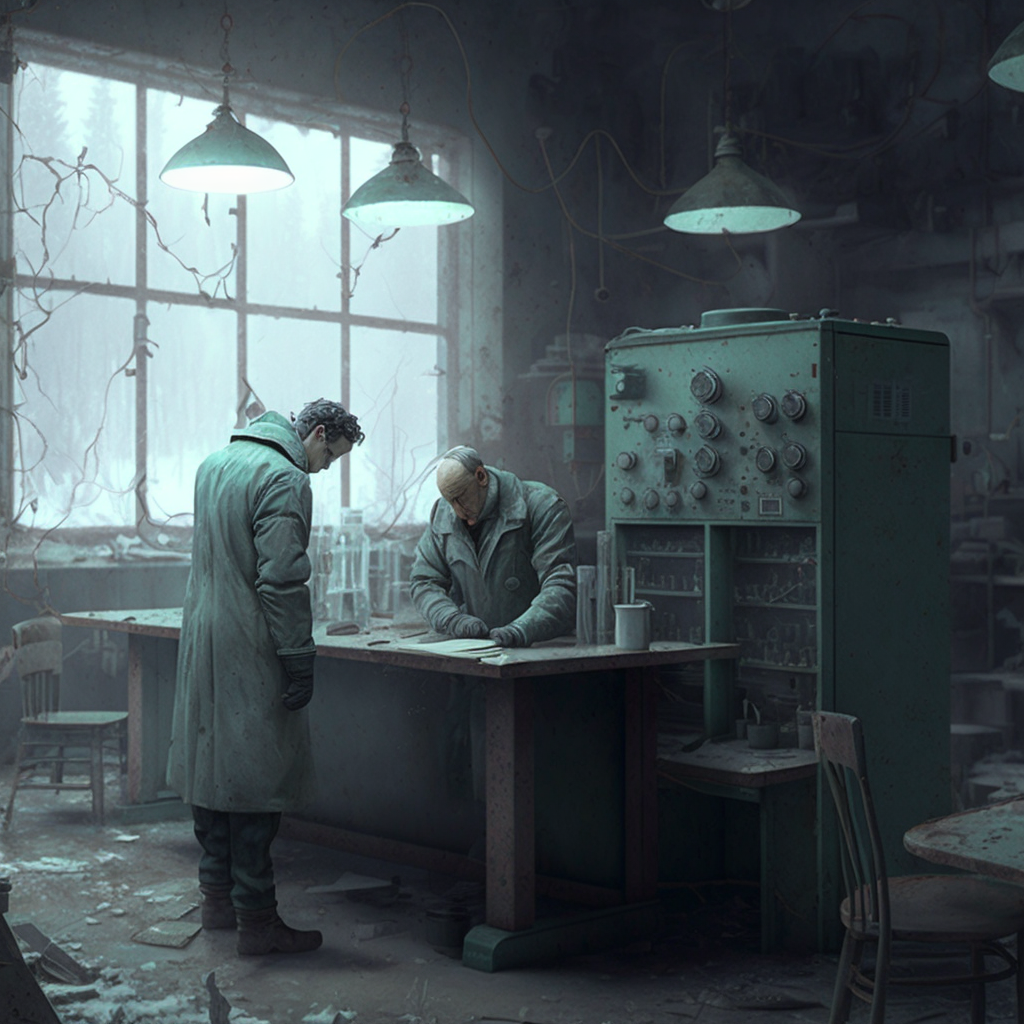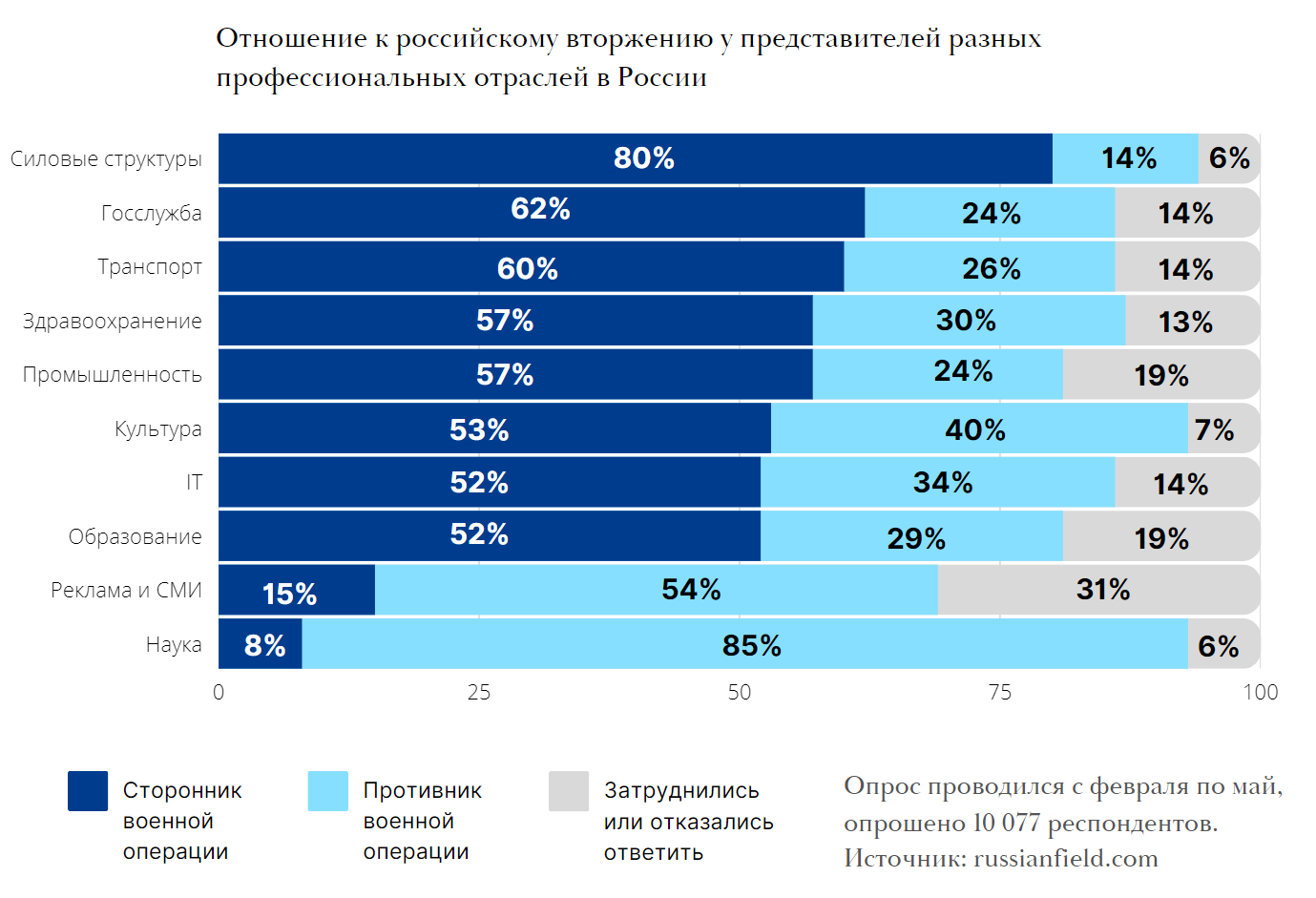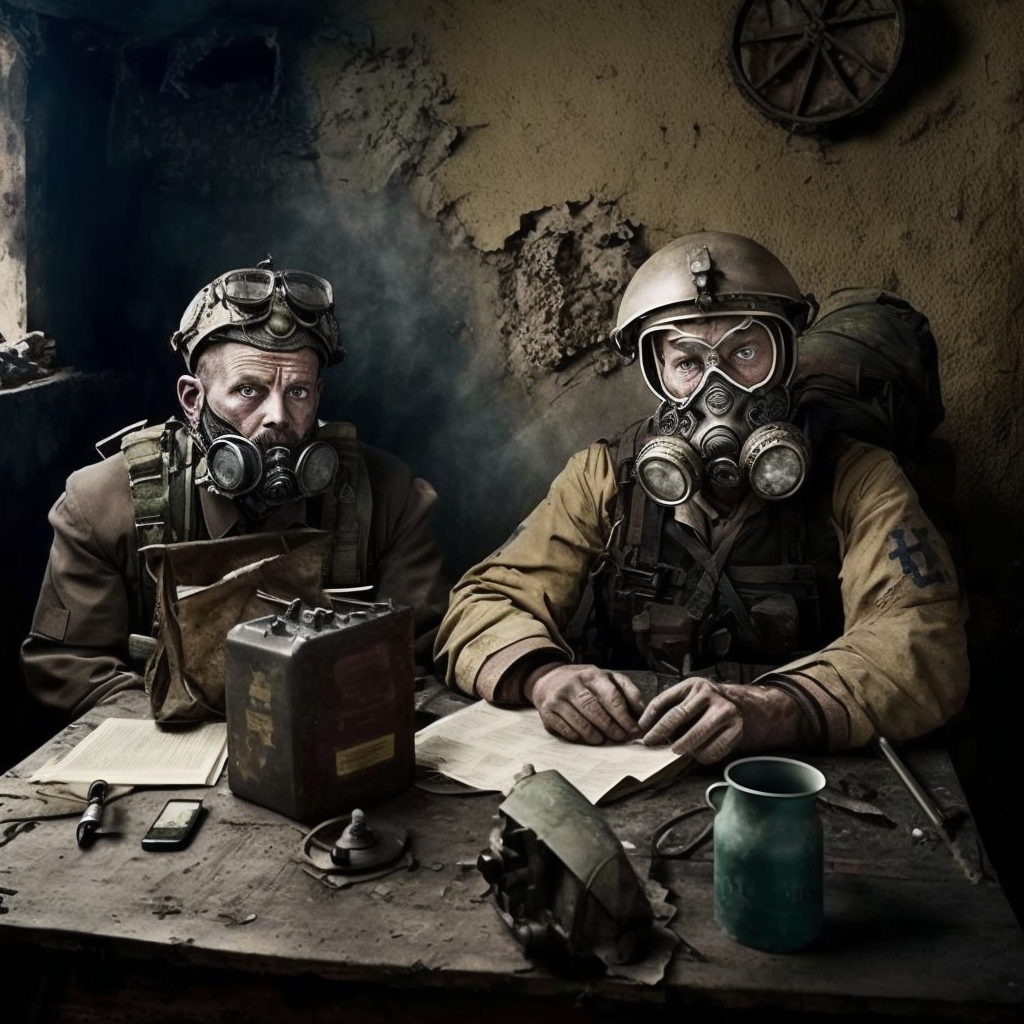Illustrations for the text were created by the Midjournay neural network
Flight of scientists
After the start of a full-scale invasion, the outflow of scientists from Russia accelerated, and after the announcement of mobilization, it acquired an avalanche-like character – everyone who can somehow continue their career abroad is leaving. Finding a job in your specialty is the main problem, but often foreign colleagues are ready to help and offer work to talented Russian specialists. This happened to 28-year-old molecular biologist Sergei. In Russia, he worked in a large research center, dealt with the problem of drug-resistant tuberculosis, studied the formation of resistance of mycobacteria to drugs. Published several articles in international journals.
As a rule, emigration is accompanied by a decrease in status. It is difficult for specialists to maintain the high position they had in Russia abroad, and far from all professors and doctors of sciences are ready for downshifting, says molecular biologist Alexander (his name has been changed), a candidate of biological sciences, co-author of about 50 publications in international scientific journals. His lab at the Medical Research Center for Oncology focuses on new therapies, studying how tumors become resistant to therapy and how to prevent it.
“My wife really wants to leave. But I have a rather high position, it is difficult to find work for the same abroad. Plus my personal projects are going well. And I can’t leave my employees, many of whom will definitely not go, ”the scientist comments.
There are various support and assistance programs for those leaving, such as, for example, Scholars at risk. However, there is a certain entry threshold, for example, the presence of a confirmed physical danger in Russia. This means that not everyone can help.

Dismissals and a ban on remote work
Some scientists who left the mobilization tried to maintain cooperation with their Russian institutions. They wanted to continue with the projects and research they had already begun. However, it is extremely rare to maintain ties. More often than not, it’s management that gets in the way, several interlocutors from major Russian institutions told The Insider. A former employee of the Moscow Engineering Physics Institute confirmed that it was the institute's leadership that did not agree:
“Everyone was forced to end the relationship one way or another. Both I and both of my colleagues were ready to continue cooperation in a remote format – for example, to conduct classes remotely or advise students on writing term papers or dissertations. But the university did not go for it. The management said that the situation is unfavorable, “you are outside of Russia, and in general we have to look at your passport with an entry stamp so that we can let you go back to work, so either come back or quit.”
Often, the physical presence of scientists in Russia is necessary for work, because it is necessary to sign documents, and sometimes it is impossible to do this remotely: not everyone has an electronic signature, and it is not always accepted. Even if the administration of the institute is loyal to those who have left and is ready to allow them to work remotely, inspection authorities may require the presence of a specialist in Russia. A Russian physicist told The Insider:
“All the time we need signatures, some kind of agreement. If a Russian grant or even several is allocated for a person, then he must appear in Russia at least once every 30 days. Therefore, it is poorly represented how people can keep in touch for a long time. Someone is trying, but, in my opinion, it’s all for a short time.”
Scientists who left Russia may lose grants issued in Russia, molecular biologist Alexander knows about such cases:
“The Russian Science Foundation, which issues the majority of grants in the Russian Federation, requires a presence in Russia all the time, except for official business trips and vacations. They have access to border crossing databases and have told the heads of the institutes that they will stop grants for those who have left. I know of two graduate students who received grants to travel to the US. And they were temporarily interrupted by Russian grants for the period that they were abroad until they returned.”

Deny access to data
If it is not possible to maintain cooperation with the institute, then scientists, as a rule, try to transfer their projects to their remaining colleagues. However, in the case of a spontaneous departure, or, moreover, already from abroad, this is difficult to do. Therefore, studies have to be closed or transported with you, if there is an opportunity and time.
Scientists who have moved to another country often lose direct access to research objects. For example, they cannot receive manuscripts that have never been digitized – there are quite a few of them in Russia. At the same time, the management often does not allow the remaining colleagues to take photographs of the archives and transfer the pictures to those who have left.
Most of all, this problem affects regionalists, historians and researchers of Russia. In the early 2010s, the so-called “archival counter-revolution” took place in Russia – the rate of declassification of documents related to the Soviet period fell, and the digitization of documents already in the public domain practically ceased. At the same time, many archives and libraries have introduced a fee for copying even with their own funds, for example, for shooting on a phone. As the source told The Insider, in one of the Moscow archives for the right to photograph one page, you need to pay 38 rubles, and in documents there can be hundreds of such pages. However, hiring a person within the country to digitize the papers is still not enough: the researcher needs to see the catalogs themselves in order to understand what they have access to.
A big problem also arises for scientists who need to work with field research, that is, physically have access to the objects of study in Russia. For example, if you need to go to remote villages and communicate with the locals. So, researchers of culture, folklore or, for example, linguists often cannot work remotely.

Reagent shortage
In Russian medical and biological laboratories, after the beginning of the Russian invasion of Ukraine, problems began with the purchase of rare reagents. Approximately 90% of the reagents are imported, PhD Marina (not her real name) from the Moscow genome stability laboratory told The Insider. There is nothing to replace many substances, there are no analogues either in Russia, or in China, or in India. There were problems even before the start of the war: if in the USA or Europe any reagent arrives after 2-5 days, then in Russia it was necessary to wait 2-3 months, and now the waiting time has increased even more. But most importantly, there are no guarantees that the reagents will eventually come.
The laboratory in which Marina works is engaged in fundamental research in the field of genome stability. She says that due to difficulties with the supply, work had to be temporarily interrupted and the purchase of reagents began:
“Already on February 24, it became clear that there would be difficulties with reagents, so from February 25, for two weeks in a row, our laboratory instead of experiments was engaged in the purchase of reagents. We were able to buy a lot a year in advance. For some reagents, we found a replacement, showing ingenuity. For example, on AliExpress, we bought cheap raffinose, which is sold there as a dietary supplement.”
However, the laboratory failed to buy special Gibco media for culturing human cells. Scientists in search of a replacement were forced to try different versions of media and sera from several manufacturers. Marina says that they tried to find a replacement among Indian and Russian counterparts, but the genetically modified cells were too sensitive and "did not want" to grow on them.
So far, it has not been possible to purchase protease inhibitors – reagents that are used in laboratories to isolate proteins for further study and work with them. Stocks have either run out or are running low. According to Marina, three companies promised to deliver them in the spring, but in the end the reagents were not delivered even in December. These problems, according to The Insider's interlocutor, were connected, rather, not with sanctions, but with a violation of logistics.
“Most likely, after the New Year, we will no longer be able to isolate proteins. We will look for inhibitors from colleagues at other institutes, we will look for new suppliers, ”Marina complains in a conversation with The Insider. So, with a rare plasmid, Russian scientists were rescued by colleagues from Belarus. However, all this is reflected in the speed of work. According to Marina, research with cell cultures has hardly progressed for half a year.
Biologist Alexander also talks about interruptions in reagents. His laboratory deals with new types of therapies in oncology, studies the resistance of tumors to therapy and the prevention of the development of this resistance. According to the biologist, large companies supplying reagents and equipment, such as Thermo Fisher, have stopped working in Russia, and their reagents are sold “in gray”:
“My colleague and I had a Telegram group for the exchange of reagents and scientific mutual assistance, before the war there were 300 people, now there are more than 5,000 people are trying to solve these problems together, looking for new suppliers.”

Severing international ties
After the beginning of the Russian invasion of Ukraine, research institutes had to close their projects. For example, the US Treasury has blacklisted the Skolkovo Foundation, the Skolkovo Institute of Science and Technology (Skoltech) and the Skolkovo Technopark, as the institutions work on projects in the field of Russian defense. And MIT (Massachusetts Institute of Technology) received a circular prohibiting work with Russian scientists.
To participate in a foreign project, a Russian scientist must renounce any affiliation with a domestic sanctioned institute or scientific center, since cooperation at the level of organizations may de facto be prohibited. Often, one of the conditions for receiving a foreign grant is the lack of connection with a Russian institute, a source from the Institute of Sociology of the Russian Academy of Sciences, who studies the moral and ethical changes in the Russian academic environment after the start of the Russian invasion, tells The Insider.
The research institutes that did not fall under the sanctions also felt the consequences of the war. The events of February 24 found scientists from Marina's laboratory actively working on a joint project with Indian colleagues, supported by the Russian Foundation for Basic Research (RFBR). Marina's colleagues, scientists from India, planned to come to Russia, but they had to cancel the trip due to uncertainties with flights and security issues. However, the specialists were able to successfully complete all the studies in a joint project with Indian colleagues and published a joint article.
“During the years of the Cold War, cooperation in civil science did not stop, I would like to hope that this will not happen now,” Marina counts. But for now, according to her, many business trips have to be abandoned:
“Unfortunately, this year we were not able to go on a business trip to the United States to continue work on the structure of the enzyme we are studying. There were simply no places to apply for a visa. But with colleagues from the USA, with two laboratories, we continue to write joint articles. One has just been sent to the British Nucleic Acids Research, the other is being finalized.”
However, almost all the scientists interviewed by The Insider say that international cooperation has not stopped. Foreign experts are sympathetic to the situation in which their Russian colleagues find themselves. But, according to Alexander, there are isolated cases of termination of cooperation. For example, Germany formally banned such cooperation; in the US, certain institutions prohibit their employees from working with Russians, says the molecular biologist:
“People turned down places in publications that they did together for several years. There are a lot of scientific journals, so there are also many places where you can publish, but some colleagues have stuck articles, and it seems that there are more refusals to publish. Sometimes editors can't find reviewers – they refuse to review Russians."
“We expect that next year they can cut funding, more colleagues will leave, there will be even fewer collaborations,” says Alexander. “But for now, we expect to work and at least finish the most important articles.”
The molecular biologist Sergei, who left for Sweden, also continues to publish. His last article appeared in an international journal in the summer of 2022. There were no difficulties with publications in Marina's laboratory either. Several articles are pending in international journals.
“I work as an editor for an international magazine. Now all articles are published, regardless of the country of study. There are no restrictions on financing from Russian funds,” Marina notes. – From the side of foreign colleagues, I met only understanding. Immediately after February 24, colleagues began to write to me, asking if everything was fine with me and my family, if I could attend conferences and leave the country.”

“We were offered to steal the recipe and cook the preparations ourselves”
An employee of the Institute of Solid State Physics of the Russian Academy of Sciences told The Insider that at the beginning of the war, lists compiled by various ministries and large companies went around the research centers, which contained hundreds of materials needed for the production of equipment and devices. “Scientists were asked to learn how to produce them themselves, including by violating patent law. That is, steal the recipe and cook it yourself, ”explains the scientist.
Basically, these were technologies and devices related to the oil, chemical, metallurgical industries, as well as electronics. For example, in Russia it has still not been possible to repeat the technology for the production of fluoropolymers necessary for the development of electronics. Some materials, the interlocutor continues, still manage to be imported through third countries, for example, photoresistors, without which it is impossible to assemble electronics.
However, when it comes to large, complex machines, the number of which in the world is tens, at most hundreds, there are insurmountable difficulties, the source tells The Insider. Such a technique is very easy to track and understand for whom the purchase is intended. Even if it was possible to import the equipment, it is impossible to maintain and repair it without the support of an official supplier or manufacturer, and often even use it, because the software can be disabled. For example, German equipment for spectrometry from Bruker is now almost impossible to bring to Russia due to problems with components and software. Many institutes do not even try to acquire equipment, since there is a high probability that devices costing from 10 thousand to a million dollars simply will not start.
Without the support of an official supplier or manufacturer, the equipment cannot be maintained and repaired
Many analogue developments, despite the import substitution campaign announced in 2014, are either not being carried out at all or have not yet been successful, a graduate student working in the field of superconducting electronics tells The Insider.
But there is also equipment, analogues of which can be bought from Russian developers. First of all, it is equipment in the field of space and defense industry. Since the times of the USSR, it has been possible to produce vacuum installations for metal deposition, continues the story of an employee of the Physics Institute. But they were most often of lower quality than their Western counterparts, and the researchers preferred not to take risks, especially considering that they were talking about machines costing 5-10 million rubles.
Moreover, technological shortages can also affect those areas where less highly specialized equipment is needed. For example, Andrei Makashov, a bioinformatician from the Biomedical Center, says that there are already big problems with access to computing power. Many calculations can be made on a regular computer, but for some large tasks powerful servers are needed, and most often cloud technologies were used for these purposes, which are now either very difficult or impossible to pay for.

No armor from mobilization
The impossibility of getting a reservation from military service has become one of the main factors forcing young scientists to leave Russia and, accordingly, keeping them from returning home. Currently, only teachers of Russian universities with academic degrees have received reservations from mobilization: candidates and doctors of sciences, said the head of the Ministry of Education and Science Valery Falkov.
Young specialists without a degree can be called up, despite the fact that there are especially many opponents of the war among Russian scientists. In the very first days of the Russian invasion, more than 7,000 scientists signed a letter against the conduct of a “special military operation” in Ukraine. In the spring, opinion polls showed that 85% of science workers are against Russian aggression. And according to the sociological research project Russian Field, only 8% of scientists supported the war against Ukraine.

“Many left when mobilization was announced… However, many returned when their institutes were able to make armor,” says Alexander. At the end of September, he also left for a month in Belarus, taking a vacation.
Институт, в котором находится лаборатория Александра, смог обеспечить брони всем сотрудникам от 30 до 50 лет, у которых есть ученая степень. До этого повестки приходили некоторым из них, но в результате никого не призвали. Вопрос «уехать или остаться» стал главным для всех ученых, говорит биолог. Так же считает и уехавший в Швецию Сергей:
«Мне повестку не присылали, но это мало успокаивает: теперь уже понятно, что эти люди не остановятся ни перед чем».
Некоторые ученые уехали вслед за близкими, которым пришла повестка в военкомат. Молекулярный биолог, кандидат наук и сотрудница одной из московских лабораторий Марина сейчас находится в Москве, готовится к защите докторской диссертации, но фактически вынуждена жить на две страны. Война стала для нее семейной трагедией:
«У моего мужа мама живет в Украине, для него это личное горе, он уехал из России. В нашей лаборатории никто не уехал, я продолжаю работать, живу на две страны, хотя предложения работы поступали».

Ни денег, ни исследований
Часть российских ученых ориентирована больше на национальные проекты: внутренние конференции, публикации в российских журналах — они уделяют больше внимания темам, интересным внутри страны. Другая (наиболее продвинутая) часть ориентирована больше на международную науку — они участвуют в совместных разработках, международных публикациях. Чем дальше заходила глобализация в науке, тем больше становился процент «международников». Сейчас сильнее всех страдают именно они. Поэтому можно ожидать и падения качества международного сотрудничества.
Пострадает и качество российских специалистов, уверены собеседники The Insider. Покинули страну и продолжают из нее уезжать, как правило, лучшие в своей области, ученые, у которых больше всего связей с международной наукой. Многие из специалистов такого уровня, помимо исследовательской работы, занимаются преподаванием и научным руководством. Их отъезд сильно бьет по мотивации и желанию студентов и аспирантов продолжать свой путь в науке.
Собеседники The Insider опасаются, что увеличится число случаев так называемого осознанного плагиата, когда российские ученые получают данные из исследований иностранных коллег и не указывают авторство. В условиях отсутствия доступа к зарубежному опыту российские ученые могут начать «изобретать велосипед», создавая и открывая то, что уже было создано или открыто иностранными коллегами. Это в целом замедлит развитие российской науки, так как любая современная наука не может быть национальной. Всё, что используют как рядовые граждане, так и учёные — результат международной кооперации. Если наука сконцентрируется внутри страны, то одно из важнейших современных направлений во всех сферах — сравнительные исследования — может попросту стать невозможным.
Из России уехали лучшие в своей области ученые
«В целом, я думаю, для [российской] науки настают последние дни. Или уже настали, — заявила The Insider молекулярный биолог, основатель биотехнологической компании Sendai Viralytics из США Ольга Матвеева. — Просто в России многие этого еще не понимают».
Российскую науку ждет и сокращение финансирования. В опубликованном проекте бюджета на 2023–2025 годы указано, что на гражданскую науку планируется потратить: в 2023-м — 492 млрд рублей (1,69%), 2024-м — 490 (1,66%), а в 2025-м и вовсе — 473 (1,62%). Для сравнения, в 2021 году выделялось 626 млрд рублей (2,53%), а в прошедшем 2022-м — 569 (2,85%). Такое резкое уменьшение финансирования может привести как к общему ухудшению обеспечения институтов и исследовательских центров (например, новым оборудованием или возможностью чинить старое), так и к падению зарплат ученых, которые, за исключением нескольких сфер (например, физики и биоинформатики), и так невероятно малы.


